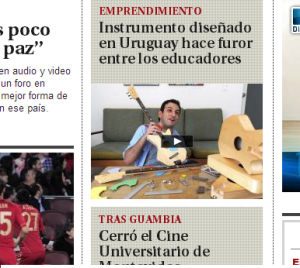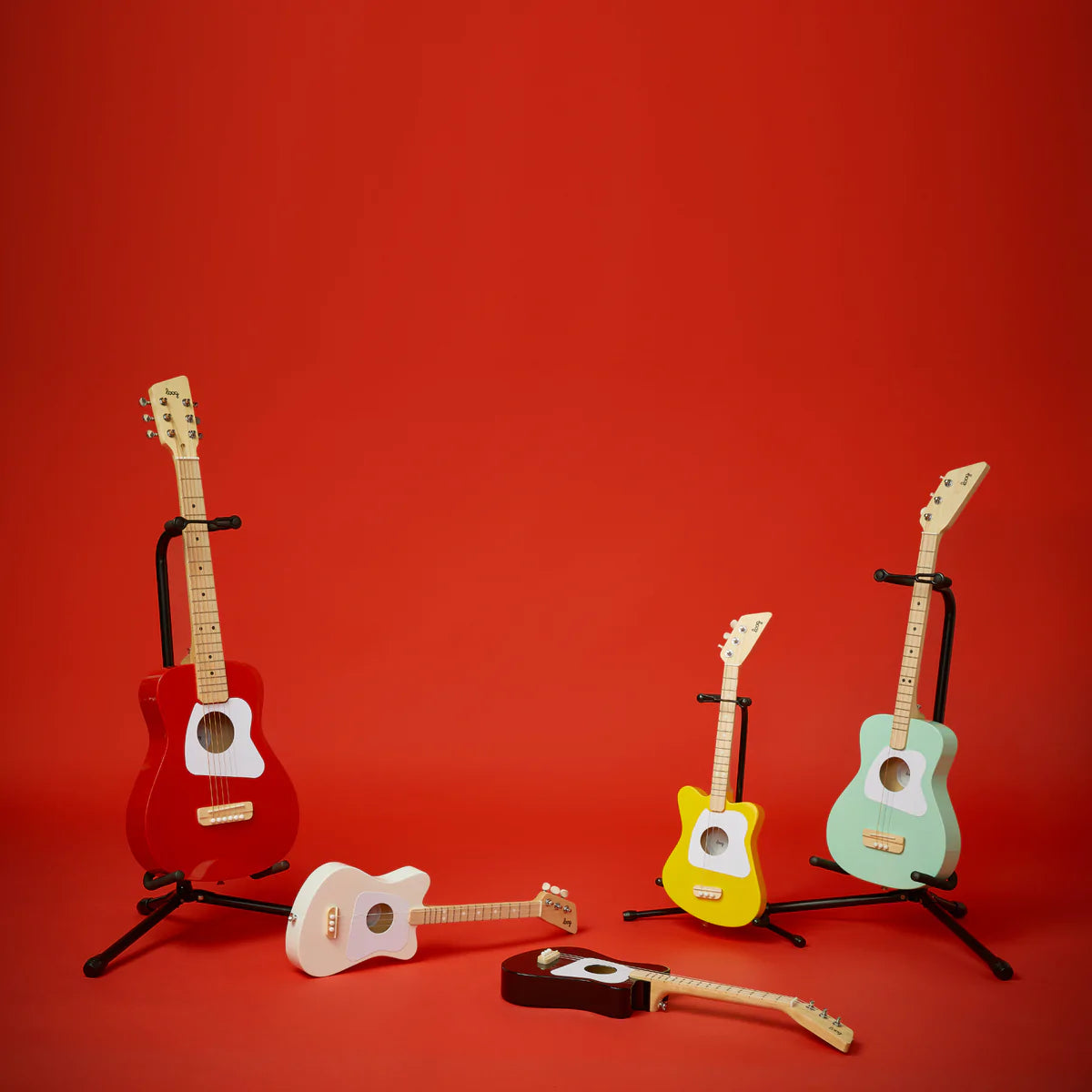On Being a Kid, Reading the Paper and What’s In Store for Loog Guitars
 Seeing your name in the paper is always something, even if it’s in another language. As kids, we’d see our parents reading those tiny never-ending words and awe at the world outside our homes full of people doing the good, the bad and the ugly. You grow up and realize it’s actually not that hard to get on the paper -robbing a bank should do it- but when it’s you, and it’s for something positive, you’re still that kid gawking at all the unfamiliar faces in black and white.
Seeing your name in the paper is always something, even if it’s in another language. As kids, we’d see our parents reading those tiny never-ending words and awe at the world outside our homes full of people doing the good, the bad and the ugly. You grow up and realize it’s actually not that hard to get on the paper -robbing a bank should do it- but when it’s you, and it’s for something positive, you’re still that kid gawking at all the unfamiliar faces in black and white.
It’s especially special when it’s in your own home country. Uruguay’s El Pais published a feature on the Loog on Wednesday which has a video and even spent some time in the paper’s homepage. We received tons of love (from people we know, from people we know who don’t know we know them and from people we don’t know) in just a few days and wanted to share that with you. But also, if you’re patient, there’s some stuff that’s interesting to anyone who loves the Loog right at the end of the piece. You can find the translation below. Thanks for sharing our joy 
Uruguayan Instrument Dazzles Educators
A three-string guitar for kids created by a Uruguayan has become global thanks to the Internet and investors from over 30 countries.
Less than ten people in Uruguay, a small factory in China, a US-based distributor and the Internet have made Loog Guitars jump from a crowdfunding platform to becoming a successful global company.
35 year-old Rafael Atijas stands behind the project, born from a business plan created to finish his MS in Integrated Marketing in the United States. It was then that he began toying with the idea of creating a guitar for kids that was “different”.
Today, Loog Guitars produces 2,000 guitars a year, which are then sold online and to distributors in the US, Japan and New Zealand.
Early this year the Loog Guitar was also showcased in a California fair, where it was chosen by US teachers as the best tool to learn music for elementary school kids. Apart from feeling proud for winning the accolade, “this also proves what we say our guitar does,” Atijas said.
“Our main premise was for the guitar to have three stings, a minimalistic design and for it to come unassembled,” Atijas, who loves music and industrial design, explained.
The idea was to simplfy the six-string instrument and use quality materials to assure a perfect sound. The thesis didn’t call for a prototype but Atijas got carried away and, back in Uruguay, got together a group of designers and a luthier to develop the product.
His main goal was to get $15,000 to produce the first 100 guitars but he managed to get $65,000 instead, from over 400 people that believed in the project and bought the instrument beforehand.
“We posted it in March 2011 and by September 2011 we were delivering the first set of guitars. Seeing that people from several countries were really interested in purchasing one, we decided to keep on going and turn the project into a company,” Atijas explained.
Financed by a national innovation fund, the team worked nine months on the finished prototype: one small guitar, 74 cm long, made from real wood and sustainable materials – maple for the neck and rosewood for the bridge. It was delivered unassembled so that kids could learn even more about the instrument while building it.
All that was left was to launch the product. Atijas and his team then turned to Kickstarter.com, which allows original projects to crowdsource their funds among whoever finds them interesting.
The guitars are produced in China and later exported to the US, where a company stores and delivers them.
Atijas coordinates everything from Uruguay, where four people work with him permanently while another four help periodically. “It’s a pretty globalized model. This is possible now, while 10 years ago it probably wasn’t. Maybe you could create software but producing, storing, moving boxes from one country to another needs a bigger structure,” he said.
And it’s not just because of how technology evolved. “China opening its markets to the world changed things. We work with a small factory, a workshop with just 15 people. The fact that that kind of factory in China can connect with someone in Uruguay and even transfer funds from bank account to bank account… that didn’t exist 10 years ago,” he explained.
“The same happens with selling things via internet. It’s now easier to accept credit card payments from all around the world,” he said. And faced with such success, the company is now looking to expand.
“Our goal is to grow slowly, always focusing on making a quality product. Our idea is to grow at least tenfold. We believe that the market’s there, to sell many more guitars,” he said. And for that, Atijas is already creating another guitar which he promises to be “quite different” and another instrument that he prefers to keep under wraps.

